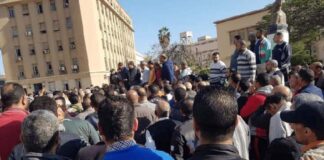The invasions of Iraq and Afghanistan were justified by Western leaders with rhetoric about bringing “democracy” and “liberation” to the Middle East. But the revolts shaking the Arab world have exposed just how empty that rhetoric always was.
The US is determined to maintain control of the Middle East’s vast oil wealth. To do so, they have propped up a network of bullies and warmongers across the region for decades.
Egypt’s former dictator Hosni Mubarak played a key role in undermining opposition by other Arab countries to the US client state of Israel, and faithfully maintained Egypt’s historic peace treaty with Israel signed in 1979.
For its loyalty, the US funded Mubarak’s dictatorship with $1.5 billion dollars in US aid each year, most of it spent on the military. The teargas canisters thrown at protesters in Egypt were marked: “Made in USA”.
Recently, Egypt’s army has helped maintain the blockade of Gaza by policing their border with the Palestinian territory, the Rafah crossing.
Mubarak’s spectacular downfall could have massive consequences for imperialism, Israel and other Western-backed dictators and oil kingdoms. The foundations of US control over the region are crumbling.
Tunisia’s dictator Ben Ali, once praised by the West for opening up his economy to Western corporations and collaborating with the CIA rendition programs, was toppled in January, sparking Egypt’s revolt. The two revolutions have sparked protest across the Arab world.
Region-wide revolt
Protests calling for an end to corruption and unemployment—and for the first time, the resignation of dictator Ali Abdullah Saleh—have spread through Yemen. In recent months, Saleh has been collaborating with the US and Saudi Arabia to conduct secret bombing campaigns in Yemen, creating hundreds of refugees. This and endemic poverty is sowing discontent. On the streets, protestors took up a chant: “Tunisia first, Egypt after it and Yemen in the coming future.”
In Algeria, Tunisia’s neighbour, the government has said they will lift a decades-old state of emergency law that has long been used to repress dissent. They have moved to cut taxes on sugar and cooking oil, and increase the supply of wheat. This is a response to mass riots calling for the resignation of the corrupt President Abdelaziz Bouteflika that shook the capital Algiers in January and again in February. A Guardian columnist summed up the grievances driving so many onto the streets: “[Algeria] also shares a large, pervasive security presence, authoritarian rule and a general sense that citizens are not benefiting from its wealth and resources.”
Jordan’s King Abdullah was forced to sack his entire government in the wake of weekly street protests over rising prices and unemployment that have been ongoing since early December—and thousands are still on the streets to push the new cabinet to meet their demands.
People in Bahrain faced rubber bullets, sound bombs and shotguns to demand the resignation of the King—even after he attempted to placate the population with a payment of $3000 for each individual.
And the democracy movement in Iran, the “green movement”, born out of protests against rigged elections in 2009, has shown it is still a force to be reckoned with. Iran’s leaders hypocritically praised Tunisia and Egypt’s revolt, but their state police used tear gas and fierce beatings in an attempt to stop a demonstration of tens of thousands on February 14. Shouts of “death to the dictator” rung out across the streets and are ringing out from rooftops in the night.
Other leaders are trying reforms to stop revolutions. Syria has unblocked social networking web sites and offered fuel subsidies, and Iraq’s pro-Western leader Nouri al-Maliki has made moves to deal with the capital Baghdad’s chronic electricity shortages. Their concessions, however, may just add fuel to the fire.
A beautiful mood of defiance and courage is spreading through the region. It holds the potential to throw out the rest of the autocratic dictators that do the bidding of the US at the expense of their people, to end the horror of Israeli apartheid, and ultimately, to share the wealth of the Gulf amongst the people that work so hard to create it.
It’s a potential that has struck fear into the hearts of Western leaders. One Israeli commentator in Yediot Ahronoth described how “Israelis have been overtaken by fear: the fear of democracy.” While Obama is now posing as supportive of a transition to democracy, the US is negotiating behind the scenes to make sure whatever regimes emerge in Egypt and Tunisia support their interests.
But the Arab masses are not going to let them have it so easy anymore.
Amy Thomas





